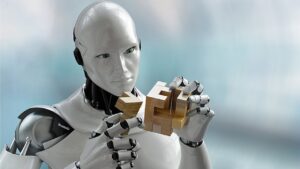
The rise of artificial intelligence (AI) is transforming the job market, automating tasks previously performed by humans and creating new roles in the process. While some fear widespread job displacement, the reality is more nuanced. Instead of simply “losing” jobs, AI is reshaping the nature of work, requiring adaptation and upskilling. Certain job categories are, however, more vulnerable to AI-driven automation than others.
Jobs at High Risk of Automation:
• Data Entry Clerks: AI-powered systems excel at processing large volumes of data quickly and accurately, making data entry clerks’ roles highly susceptible to automation.
• Truck Drivers (Long-Haul): Self-driving technology is rapidly advancing, posing a significant threat to long-haul truck drivers in the near future. Shorter routes and specialized delivery may be slower to automate.
• Manufacturing Workers (Repetitive Tasks): Robots and automated systems are already prevalent in manufacturing, and AI will further enhance their capabilities, leading to a reduction in jobs involving repetitive manual tasks.
• Cashiers: Self-checkout kiosks and automated payment systems are already replacing many cashiers, and this trend is likely to continue.
• Customer Service Representatives (Basic Inquiries): AI chatbots and virtual assistants can handle many routine customer service inquiries, potentially reducing the need for human representatives.
• Proofreaders and Typists: AI-powered grammar and spell-checking tools are becoming increasingly sophisticated, potentially minimizing the demand for proofreaders and typists.
• Financial Analysts (Basic tasks): AI algorithms can analyze financial data and identify trends much faster than humans for simple tasks, though more complex analysis will still need human oversight.
• Accountants (Basic tasks): Similar to financial analysts, AI is automating basic accounting functions, such as data entry and reconciliation.
• Doctors (diagnosis support): AI can assist in diagnosis, but won’t fully replace the need for human doctors’ experience and judgement.
• Teachers (grading, lesson planning): AI can automate some aspects of teaching, like grading and creating lesson plans, but cannot fully replace the human interaction.
• Writers (basic content): AI can generate basic content, but more complex writing will likely still require human creativity and critical thinking.
• Software Developers (basic coding): AI can assist with basic coding, but more complex software development will still need human expertise.
Jobs Less Likely to be Automated (at least in the near future):
• Jobs Requiring Creativity and Complex Problem-Solving: These roles demand human ingenuity, critical thinking, and emotional intelligence, which AI currently struggles to replicate. Examples include artists, writers (in specialized fields), scientists, engineers (complex projects), surgeons, and social workers.
• Jobs Requiring Strong Interpersonal Skills: AI can’t effectively replace the human connection needed in jobs like nursing, teaching (in a holistic sense), therapists, and sales representatives who build complex relationships.
• Jobs Requiring Physical Dexterity and Adaptability: While robotics is advancing, there are many jobs that require unpredictable physical dexterity and adaptability, which AI systems haven’t yet mastered.
Important Note: This is not an exhaustive list, and the impact of AI on the job market will continue to evolve. The focus should be on adaptability and acquiring skills that complement AI, rather than fearing replacement. The key to navigating this changing landscape is continuous learning and upskilling to remain relevant and valuable in the workforce.

1 360 509 4302
info@dnahighlife.com